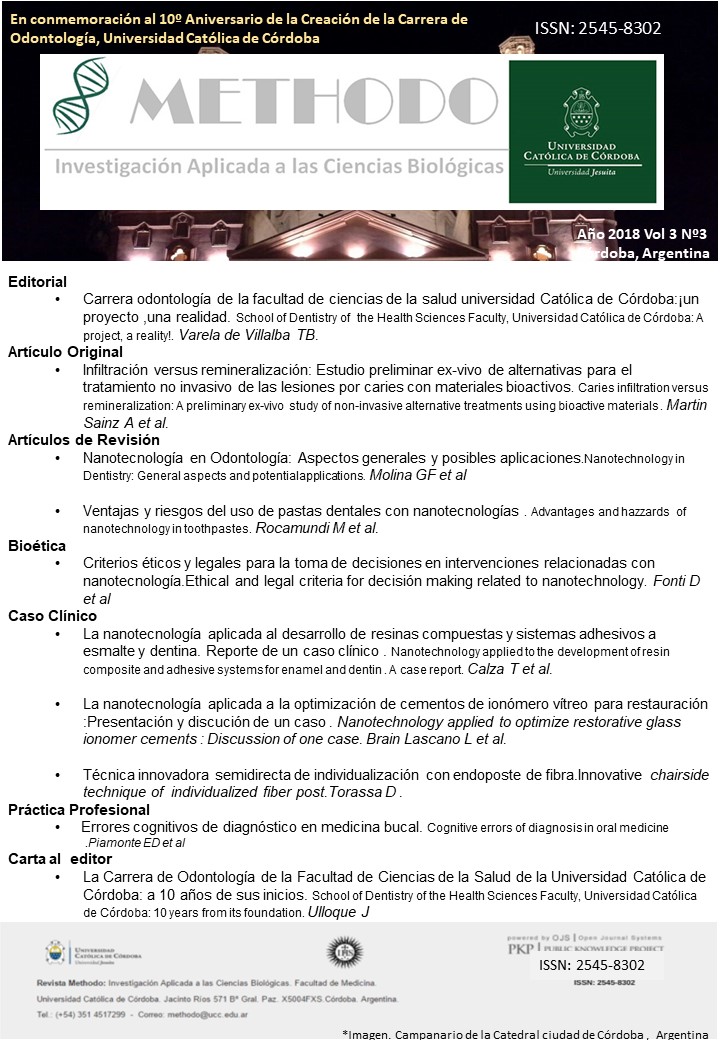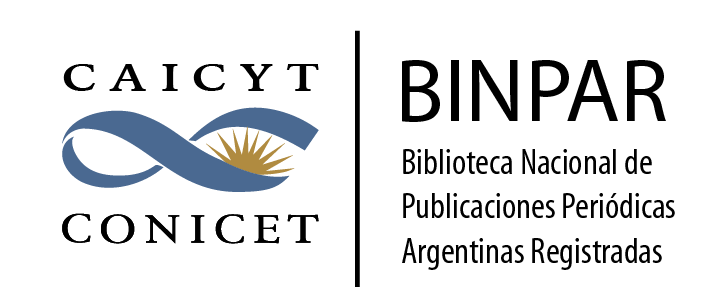Ventajas y riesgos del uso de pastas dentales con nanotecnologías
DOI:
https://doi.org/10.22529/me.2018.3(3)04Palabras clave:
nano-odontología, nanodentífricos, nanotoxicidadResumen
El presente artículo de actualización analiza las ventajas y riesgos del uso de nanopartículas en pastas dentales. La nanotecnología puede mejorar sus propiedades ayudando al proceso de remineralización del diente, controlar el crecimiento bacteriano o proporcionar minerales para mejorar el control del pH. Con este fin se han agregado: nanohidroxiapatita, nanocalcio, fosfato de calcio, trimetafosfato de sodio, nanopartículas de plata, quitosán, entre otras. Por otro lado, se han descripto algunos efectos nocivos de estas nanotecnologías, lo que nos motiva a intensificar su estudio. Conclusiones: La nano-odontología ha otorgado nuevas herramientas para la atención preventiva de la salud. La toxicidad oral para los nanodentífricos es baja, pero algunos pueden llegar al intestino, y a través de él a la circulación sanguínea y causar disturbios sistémicos. Es necesario profundizar las investigaciones en estos materiales, a fin de mejorar sus efectos beneficiosos, e identificar y eliminar sus riesgos.Descargas
Referencias
Martínez HR, Abdala HM, Treviño E, Garza G et al. Aplicación de la nanotecnología en odontología: Nano-odontología. Rev.CES Odont.2011;24(2)87-91.
Cantin M, Vilos OC, Suaz GI. Nanoodontologia: El futuro de la Odontología basada en sistemas nanotecnologicos. Int. J. Odontostomat 2010;4(2):127-132. https://doi.org/10.4067/S0718-381X2010000200005
Bhardwaj A, Bhardwaj A, MisuriyaA, Maroli S et al. Nanotechnology in dentistry: Present and future. J of Int Oral Health 2014; 6(1):121-126.
Li G, Zhou T, Lin S, Shi S et al. Nanomaterials for Craniofacial and Dental Tissue Engineering. J Dent Res. 2017 Jul;96(7):725- 732. https://doi.org/10.1177/0022034517706678
Virlan MJR, Miricescu D, Radulescu R, Sabliov CM et al. Organic Nanomaterials and Their Applications in the Treatment of Oral Diseases. Molecules 2016, 21, 207; https://doi.org/10.3390/molecules21020207
Besinis A, De Peralta T1, Tredwin CJ1, Handy RD. Review of nanomaterials in dentistry: interactions with the oral microenvironment, clinicalapplicatio ns, hazards, and benefits. ACS Nano. 2015 Mar 24;9(3):2255-89. https://doi.org/10.1021/nn505015e
Cheng L, Zhang K, Weir MD, Melo MA et al. Nanotechnology strategies for antibacterial and remineralizing composites and adhesives to tackle dental caries. Nanomedicine 2015;10(4):627-41 https://doi.org/10.2217/nnm.14.191
Hill RG, Gillam DG, Chen X. The ability of a nano hydroxyapatite toothpaste and oral rinse containing fluoride to protect enamel during an acid challenge using 19F solid state NMR spectroscopy. Materials Letters 2015;156: 69-71. https://doi.org/10.1016/j.matlet.2015.04.140
Esteves-Oliveira M, Santos NM, MeyerLueckel H, Wierichs RJ et al. Cariespreventive effect of anti-erosive and nanohydroxyapatite-containing toothpastes in vitro. Clin Oral Investig. 2017 Jan;21(1):291- 300. https://doi.org/10.1007/s00784-016-1789-0
Mielczarek A, Michalik J. The effect of nanohydroxyapatite toothpaste on enamel surface remineralization. An in vitrostudy. Am J Dent 2014 Dec;27(6):287-90.
Makeeva IM, Polyakova MA, Avdeenko OE, Paramonov YO et al. Effect of long term application of toothpaste Apadent Total Care Medical nano-hydroxyapatite. Stomatologiia (Mosk) 2016;95(4):34-36. https://doi.org/10.17116/stomat201695434-36
Mellgren T, Qin T, Öhman-Mägi C, Zhang Y et al. Calcium Phosphate Microspheres as a Delivery Vehicle for Tooth-Bleaching Agents. J Dent Res 2018, 97(3):283-288. https://doi.org/10.1177/0022034517741295
Rai N, Sandhu M, Sachdev V, Sharma R. Evaluation of Remineralization Potential of Beverages modified with Casein Phosphopeptide-Amorphous Calcium Phosphate on Primary and Permanent Enamel: A Laser Profiler Study. Int J of Clin Pediatric Dentistry, 2018;11(1):7-12 https://doi.org/10.5005/jp-journals-10005-1475
Souza BM, Comar LP, Vertuan M, Fernandes Neto C et al. Effect of an Experimental Paste with Hydroxyapatite Nanoparticles and Fluoride on Dental Demineralisation and Remineralisation in situ. Caries Res 2015; 49:499-507 https://doi.org/10.1159/000438466
Rahardjo A, Nugraheni DDT, Humaira G, Adiatman M Et al. Efficacy of Toothpaste Containing Nano Calcium in Dentin Remineralization. Makara J Health Res 2015,19(2):43-47. https://doi.org/10.7454/mjhr.v19i2.4604
Danelon M, PelimPessan J, SouzaNeto FN, Rodrigues de Camargo E et al. Effect of toothpaste with nano-sized trimetaphosphate on dental caries: In situ study. J Dent 2015 43(7):806-813. https://doi.org/10.1016/j.jdent.2015.04.010
Favretto CO, Delbem ACB, Moraes JCS, Camargo ER et al. Dentinal tubule obliteration using toothpastes containing sodium trimetaphosphatemicroparticles or nanoparticles. Clin Oral Investig. 2018 Feb 20. doi: 10.1007/s00784-018-2384-3. https://doi.org/10.1007/s00784-018-2384-3
Fawzy AS, Priyadarshini BM, Selvan ST, Lu TB et al. Proanthocyanidins-Loaded Nanoparticles Enhance Dentin Degradation Resistance. J Dent Res 2017;96(7):780-789 https://doi.org/10.1177/0022034517691757
Teixeira JA, Silva AVCE, Dos Santos Júnior VE, de Melo Júnior PC et al. Effects of a New Nano-Silver Fluoride Containing Dentifrice on Demineralization of Enamel and Streptococcus mutans Adhesion and Acidogenicity. Int J Dent 2018 May 8:1351925. https://doi.org/10.1155/2018/1351925
Bhardwaj SB, Mehta M, Gauba K. Nanotechnology: Role in dental biofilms. Indian J Dent Res 2009; 20:511-3. https://doi.org/10.4103/0970-9290.59440
Chávez de Paz LE, Resin A, Howard KA, Sutherland DS et al. Antimicrobial Effect of Chitosan Nanoparticles on Streptococcus mutans Biofilms. Appl Environ Microbiol 2011; June:3892-5 https://doi.org/10.1128/AEM.02941-10
Mishra S. Nanotechnology in medicine. Indian Heart J. 2016 May-Jun;68(3):437-9. https://doi.org/10.1016/j.ihj.2016.05.003
Khurshid Z, Zafar M, Qasim S, Shahab S Et al. Advances in Nanotechnology for Restorative Dentistry. Materials 2015, 8, 717- 731. https://doi.org/10.3390/ma8020717
De la Fuente Hernández J, Álvarez Pérez MA, Sifuentes Valenzuela MC. Uso de nuevas tecnologías en odontología. Revista Odontológica Mexicana 2011;15 (3): 157-162 https://doi.org/10.22201/fo.1870199xp.2011.15.3.25912
Sahoo SK, Parveen S, Panda JJ. The present and future of nanotechnology in human health care. Nanomedicine. 2007 Mar;3(1):20-31. https://doi.org/10.1016/j.nano.2006.11.008
Rompelberg C, Heringa MB, van Donkersgoed G, Drijvers J Et al. Oral intake of added titanium dioxide and its nanofraction from food products, food supplements and toothpaste by the Dutch population. Nanotoxicology. 2016;10(10):1404-1414. https://doi.org/10.1080/17435390.2016.1222457
World Organization Health. Nanotechnology and human health: Scientific evidence and risk governance. Report of the WHO expert meeting 10-11. December 2012, Bonn, Germany. Copenhagen, WHO Regional Office for Europe, 2013.
Li Y, Yan J, Ding W, Chen Y et al. Genotoxicity and gene expression analyses of liver and lung tissues of mice treated with titanium dioxide nanoparticles. Mutagenesis 2017; 32:33-46. https://doi.org/10.1093/mutage/gew065
Bernauer U, Bodin L, Celleno L, Chaudhry Q et al. SCCS OPINION ON Titanium Dioxide (nano form) as UV-Filter in spraysSCCS/1583/17 Final versión. 2018.
Heringa MB, Geraets L, Van Eijkeren JC, Vandebriel RJ et al. Risk assessment of titanium dioxide nanoparticles via oral exposure, including toxicokinetic considerations. Nanotoxicology. 2016;10(10):1515-25. https://doi.org/10.1080/17435390.2016.1238113
Ze Y, Hu R, Wang X, Sang X, Ze X, Li B, et al. Neurotoxicity and gene expressed profile in brain injured mice caused by exposure to titanium dioxide nanoparticles. J Biomed Mater Res A 2014;102(2):470-8. https://doi.org/10.1002/jbm.a.34705
Mao Z, Xu B, Ji X, Zhou K Et al. Titanium dioxide nanoparticles alter cellular morphology via disturbing the microtubule dynamics. Nanoscale 2015. https://doi.org/10.1039/C5NR01448D
Nallanthighal S, Chan C, Bharalid DJ, Mousad SA et al. Particle coatings but not silver ions mediate genotoxicity of ingested silver nanoparticles in a mouse model. NanoImpact 2017; 5:92-100. https://doi.org/10.1016/j.impact.2017.01.003
Epple M. Review of potential health risks associated with nanoscopic calcium phosphate. Acta Biomater 2018;19(18):30430-6. https://doi.org/10.1016/j.actbio.2018.07.036















